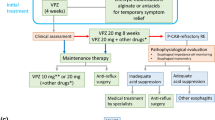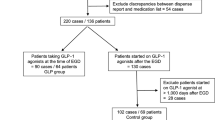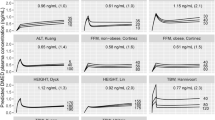Abstract
The role of body temperature in the acid stimulatory mechanism by meprizole, a duodenal ulcerogen, was investigated in urethane-anesthetized rats. Subcutaneous administration of mepirizole (60 and 200 mg/kg) increased acid secretion in a dose-dependent manner and resulted in duodenal lesions within 8 hr. The acid secretory and ulcerogenic responses induced by mepirizole were inhibited completely by vagotomy and significantly reduced by subcutaneous pretreatment with atropine (1 mg/kg), hexamethonium (10 mg/kg), or clonidine (1 mg/kg). During anesthesia, body temperature was decreased to 34 °C in control rats but further reduced to 31 °C after administration of mepirizole. When body temperature was maintained at 36 °C during a test period, mepirizole caused significantly less effect on acid secretion and produced less damage in the duodenum. In addition, intracisternal administration of antiserum of thyrotropin-releasing hormone (TRH: 5 µ1/rat) also significantly inhibited acid hypersecretion and development of duodenal lesions in response to mepirizole. When acid output induced by mepirizole was plotted against duodenal lesion score from one group to another, a significant linear relationship was found between these two values (r=0.814,P<0.05). We conclude that mepirizole induced vagally mediated acid secretion and duodenal lesions in anesthetized rats. These responses may occur centrally in association with lowering of body temperature, which potentiates the acid stimulatory effect of mepirizole, probably through a TRH-dependent mechanism.
Similar content being viewed by others
References
Okabe S, Ishihara Y, Inoo H, Tanaka H: Mepirizole-induced duodenal ulcers in rats and their pathogenesis. Dig Dis Sci 27:242–249, 1982
Ishihara Y, Yamada Y, Hata Y, Okabe S: Species and strain differences in mepirizole-induced duodenal and gastric lesion. Dig Dis Sci 28:552–558, 1983
Tanaka H, Ueki S, Ohno T, Takeuchi K, Okabe S: Pathogenic mechanisms involved in mepirizole-induced duodenal damage in the rat. Jpn J Pharmacol 42:383–396, 1986
Tabata K, Jacobson ED, Chen MH, Murphy RF, Joffe SN: Decrease in alkaline secretion during duodenal ulceration induced by mepirizole in rats. Gastroenterology 87:396–401, 1984
Goto Y, Debas HT, Tache Y: Pyrazole compound, DA-396, produces prostaglandin-resistant, perforating duodenal ulcers by a central mechanism. Gastroenterology 84:1172, 1983 (abstract)
Kurebayashi Y, Asano M, Hashizume T, Akashi A: Gastric hyperacidity and duodenal ulcer formation induced by dulcerozine in rats. Jpn J Pharmacol 36:121–123, 1984
Ueshima K, Matsumoto J, Takeuchi K, Okabe S: Effects of gefarnate on the duodenal mucosa and the gastric acid and duodenal alkaline responses in rats. Ther Res 12:191–200, 1991
Niida H, Takeuchi K, Ueshima K, Okabe S: Vagally mediated acid hypersecretion and lesion formation in anesthetized rat under hypothermic conditions. Dig Dis Sci 36:441–448, 1991
Hara N, Hara Y, Natsume Y, Goto Y: Gastric hyperacidity and mucosal damage caused by hypothermia correlate with increase in GABA concentrations of the rat brain. Eur J Pharmacol 194:77–81, 1991
Niida H, Takeuchi K, Okabe S: Role of thyrotropin-releasing hormone in acid secretory response induced by lowering of body temperature in the rat. Eur J Pharmacol 198:137–142, 1991
Dunnett CW: A multiple comparison procedure for comparing several treatments with a control. Am J Stat Assoc 50:1096–1121, 1955
Szabo S, Reynolds ES, Lichtenberger LM, Haith LR, Dzau VJ: Pathogenesis of duodenal ulcer. Gastric acidity caused by propionitrile and cysteamine in rats. Res Commun Chem Pathol Pharmacol 16:311–323, 1977
Takeuchi K, Nishiwaki H, Niida H, Okabe S: Body temperature-dependent action of baclofen in rat stomach: Relation to acid secretion and ulcerogenicity. Dig Dis Sci 35:458–466, 1990
Robert A, Leung FW, Kaiser DG, Guth PH: Potentiation of aspirin-induced gastric lesions by exposure to cold in rats. Gastroenterology 97:1147–1158, 1989
Mersereau WA, Hinchey EJ: Hypothermia-induced gastric hypercontractility in the genesis of the restraint ulcer. Can J Surg 24:622–625, 1981
Murakami M, Lam SK, Inaba M, Miyake T: Pathophysiology and pathogenesis of acute gastric mucosal lesions after hypothermic restraint stress in rats. Gastroenterology 88:660–665, 1985
Tache Y, Vale W, Brown M: Thyrotropin-releasing hormone: CNS action to stimulate gastric acid secretion. Nature 287:149–151, 1980
Jobin M, Ferland L, Cote J, Labrie F: Effect of exposure to cold on hypothalamic TRH activity and plasma levels of TSH and prolactin in the rat. Neuroendocrinology 18:204–212, 1975
Maeda-Hagiwara M, Watanabe H, Watanabe K: Inhibition by central alpha2-adrenergic mechanism of thyrotropin-releasing hormone-induced gastric acid secretion in the rats. Jpn J Pharmacol 36:131–136, 1984
Takeuchi K, Furukawa O, Tanaka H, Okabe S: A new model of duodenal ulcers induced in rats by indomethacin plus histamine. Gastroenterology 90:636–645, 1986
Takeuchi K, Ohtsuki H, Okabe S: Role of HCO −3 secretion in the etiology of duodenal ulcers induced by mepirizole rats. Gastroenterology 86:1276, 1984 (abstract)
Robert A, Tabata K, Joffe SN, Jacobson ED: A decrease in prostaglandin synthesis, by itself, is not the cause of mepirizole-induced duodenal ulcers in rats. Gastroenterology 90:1605, 1986 (abstract)
Tanaka H, Nakagawa M, Takeuchi K, Okabe S: Effects of mepirizole and other basic antiinflammatory drugs on ethanol-induced gastric lesions in rats. Dig Dis Sci 34:238–245, 1989
Author information
Authors and Affiliations
Rights and permissions
About this article
Cite this article
Ueshima, K., Takeuchi, K., Ohuchi, T. et al. Acid secretory and duodenal ulcerogenic responses induced by mepirizole in anesthetized rats. Digest Dis Sci 39, 1625–1632 (1994). https://doi.org/10.1007/BF02087767
Received:
Revised:
Accepted:
Issue Date:
DOI: https://doi.org/10.1007/BF02087767




